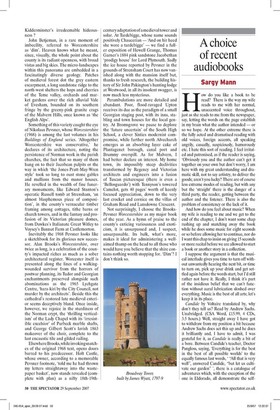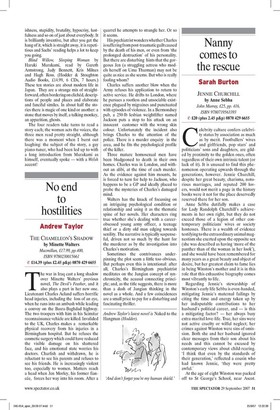A choice of recent audiobooks
Sargy Mann How do you like a book to be read? There is the way my wife reads to me with her normal, unaccented voice throughout, just as she reads to me from the newspaper, say, letting the words on the page establish in my brain what the author intended — or so we hope. At the other extreme there is the fully acted and dramatised reading with old voices, foreign accents, all speaking angrily, casually, suspiciously, humorously etc. I hate this sort of reading. I feel irritated and patronised, as if the reader is saying, 'Obviously you and the author can't get it together on your own but don't worry, I am here with my great understanding and dramatic skill, not to say artistry, to deliver the goods; aren't you lucky? There are of course less extreme modes of reading, but with any but the 'straight' there is the danger of a third party, the reader, getting between the author and the listener. There is also the problem of consistency or the lack of it.
And how do you feel about music? When my wife is reading to me and we get to the end of the chapter, I don't want some chap rushing up and snatching away the book while he does some music for eight seconds or so before allowing her to continue, nor do I want this chap to insist on giving 15 seconds or more recital before we are allowed to start a book or another story in a collection.
I suppose the argument is that the musical interlude gives you time to turn off without unwantedly hearing the next bit, or time to turn on, pick up your drink and get settled again before the words start, but I'd still rather not have it. Really, I think it's part of the insidious belief that we can't function without aural lubrication sloshed over everything. Music is the best of all arts; let's keep it in its place.
Candide by Voltaire translated by, why don't they tell us? Read by Andrew Sachs. Unabridged. (CSA Word, £15.99, 4 CDs, 3.5 hours.) Well, straight away I have got to withdraw from my position a bit because Andrew Sachs does act this up and he does it brilliantly and, I have to admit, I was grateful for it, as Candide is really a bit of a bore. Between Candide's teacher, Doctor Pangloss, saying, 'Everything is for the best in the best of all possible worlds' to the equally famous last words, "All that is very well", answered Candide, "but let us cultivate our garden" ', there is a catalogue of adventures which, with the exception of the one in Eldorado, all demonstrate the selfishness, stupidity, brutality, hypocrisy, lustfulness and so on of just about everybody. It is brilliantly inventive, but after you get the hang of it, which is straight away, it is repetitious and Sachs' reading helps a lot to keep you going.
Blind Willow, Sleeping Woman by Haruki Murakami, read by Gareth Armstrong, Judy Bennett, Kris Milnes and Hugh Ross. (Hodder & Stoughton Audio Books, £14.99, 6 CDs, 7 hours.) These ten stories are about modern life in Japan. They are a strange mix of straightforward, often bordering on cliched, descriptions of people and places and elaborate and fanciful similes. In about half the stories there is magic of one kind or another: a stone that moves by itself, a talking monkey, an apparition, ghosts.
The four readers take turns to read a story each; the woman acts the voices, the three men read pretty straight, although there was a moment when I burst out laughing: the subject of the story, a gay piano-tuner, who had been led up to with a long introduction from Murakami as himself, eventually spoke — with a Welsh accent!
























































 Previous page
Previous page